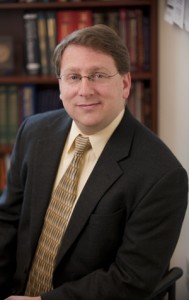MED’s Robert Lowe a Metcalf Award Winner: Teaching students how to be empathetic physicians

As a kid in New York City, Robert C. Lowe always knew he wanted to be a doctor. Teaching, however, never crossed his mind, he says, because he wasn’t the best public speaker in high school and college.
Fast forward several decades to 2010, when the School of Medicine’s graduating class selected the associate professor of medicine as its convocation speaker. Following a speech that was equal parts humor and wisdom (he opened with a quote from the Who’s Roger Daltrey), he received a standing ovation. Lowe won MED’s annual teaching award three years ago. And on Sunday, May 20, during Commencement ceremonies, he will receive one of the University’s highest teaching honors: a Metcalf Award for Excellence in Teaching.
“His exemplary commitment to the teaching of the art and science of medicine has shown students how to practice their profession with both expertise and compassion,” notes the award citation.
“Rob Lowe is a dedicated physician and inspiring educator,” says Karen Antman, dean of MED and Medical Campus provost. “We are delighted that his outstanding talent as an educator is now being recognized by the University.”
Lowe attended Harvard College and Harvard Medical School and completed his residency in internal medicine at Brigham and Women’s Hospital. He then trained in gastroenterology at Boston Medical Center. He joined the MED faculty in 2001 and later became the school’s educational director of the section of gastroenterology. His research focuses on liver disease, including viral hepatitis, cirrhosis, and advanced liver disease.
Despite his work as a physician and a researcher, Lowe says that teaching is “a real huge part of what I do.” He is a clinician educator, who in addition to teaching students is engaged in faculty development workshops as both a participant and an organizer. And he has honed his skills by taking health care education courses at Harvard’s Macy Institute.
“No matter how many times people tell me I’m good at this, I always want to see if there are things I can do to improve,” Lowe says. “And I really enjoy primarily watching the transformation of college students into physicians—both at the level of knowledge and skills, but also the attitude of becoming a physician.”
The first two years of medical school, Lowe explains, involve intense classroom time, with some exposure to clinical rounds, while the last two revolve around hospital and clinic experience. His aim has been to crossbreed these worlds in a more instructive way. “If you can give students a problem to chew on, then the stuff they’re learning…can be better applied,” he says. “I find that leads to a much better and deeper learning.”
Lowe, or “Doc,” as he prefers to be called, stresses the importance of empathy in medicine. He’s read the studies showing that medical students’ idealism dulls as they are exposed to the mental and emotional stresses inherent in medical school. He tries to counteract that by paying careful attention to how students talk or act in front of patients, leading by example and letting them know that even the smallest things they say or do may have huge impacts.
“There’s always been a tendency in medicine to tell students to dissociate themselves emotionally in order to maintain a certain calm,” he says. “But it’s a balancing act. You have to actually feel the emotions and control them. Getting rid of the emotions does not help. Patients do not appreciate unemotional doctors.”
Lowe has been cited for his skill as a physician as well as for his teaching. He has been named one of Boston’s Top Doctors three times by Boston magazine, most recently this year. Not surprisingly, he loves being a doctor.
“It allows you to actually help people as part of your daily life,” he says. “Many jobs in the world involve you succeeding at the expense of someone else. You win; they lose. You get something; someone else gives something. Here it’s not like that. Everybody wins and loses together essentially.”
His students’ admiration and respect for his devotion to medicine and teaching come across clearly in their letters recommending Lowe for a Metcalf award. “Dr. Lowe is awesome—he makes you marvel at the physiology of the GI tract!” wrote one. “He is an effective, compassionate, and knowledgeable physician,” said another. “He demonstrates how empathy itself can be healing,” from yet another. And last, but not least: “He is exactly the kind of physician I would hope to be in a few years.”
The Metcalf awards date to 1973 and are funded by a gift from the late BU professor and Board of Trustees chairman emeritus Arthur G. B. Metcalf (SED’35, Hon.’74). The Metcalf Cup and Prize winner receives $10,000, the Metcalf Award winners $5,000 each. A University committee selects winners based on nominees’ statements of teaching philosophy, supporting letters from colleagues and students, and classroom observations. This year’s Metcalf Cup and Prize winner is Andrew Duffy, a College of Arts & Sciences master lecturer in physics, and the other Metcalf Award winner is Marisa Milanese, a CAS Writing Program senior lecturer.
This BU Today article was written by Leslie Friday. She can be reached at lfriday@bu.edu.